Europe’s population is set to fall from 750 million to 570 million within six decades, and this will have profound economic and social costs. In the 1950s, 1 in 12 people were over 65, now it is 1 in 4. At the end of the century, it will be 1 in 3.
That’s 33% of the population above retirement age and in need of medical treatment. Can we afford this kind of change? How will Europe pay for its ageing population? Or are the fear mongers wrong – could a population decline actually be exactly what we need?
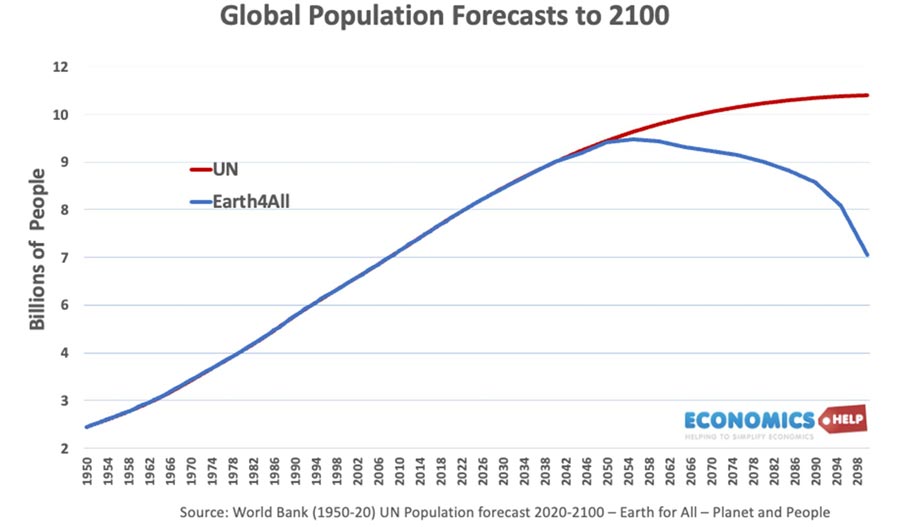
Between 1963 and 1981, the world population doubled, sparking fears of unsustainable growth in the world population, but recent models offer an alternative vision, societies decimated by ever-declining population and a shrinking base of young people. The UN forecasts the population will peak around 10 million, but a more pessimistic model suggests that faster than expected falls in birth rates mean the world population could fall to 6 billion by the end of the century.
Europe’s Falling Fertility
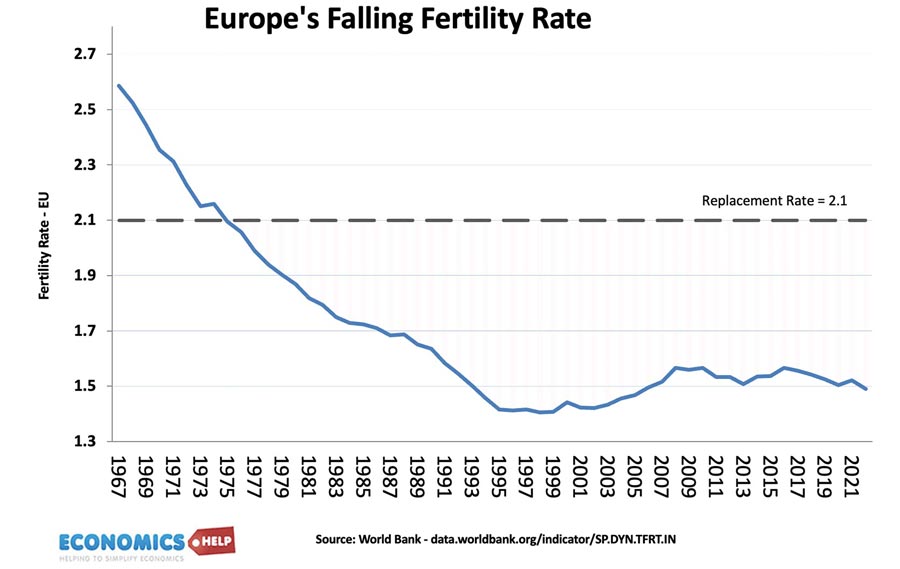
But, one thing that isn’t controversial is the decline in Europe’s population – it is already happening and politicians are sounding the alarm bells.
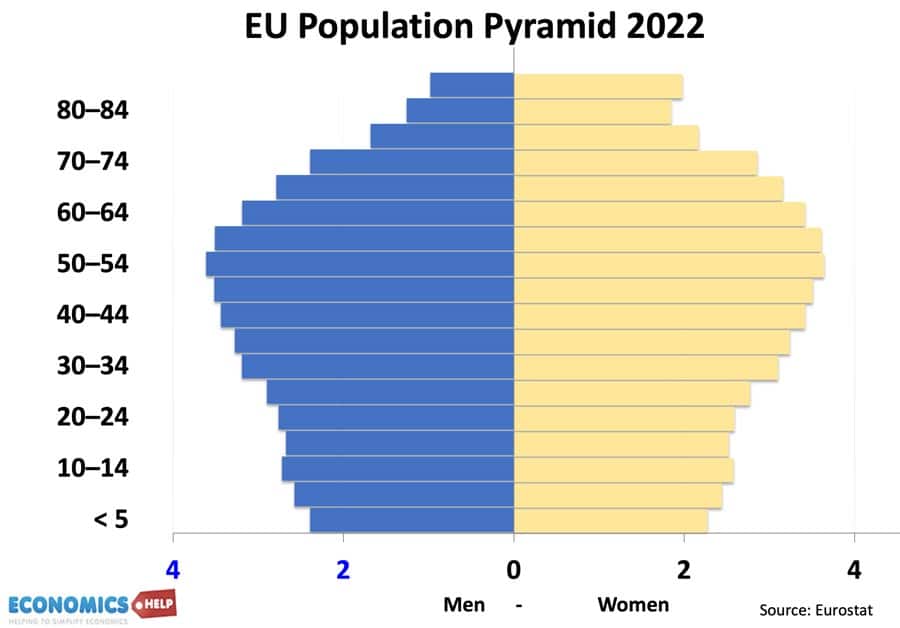
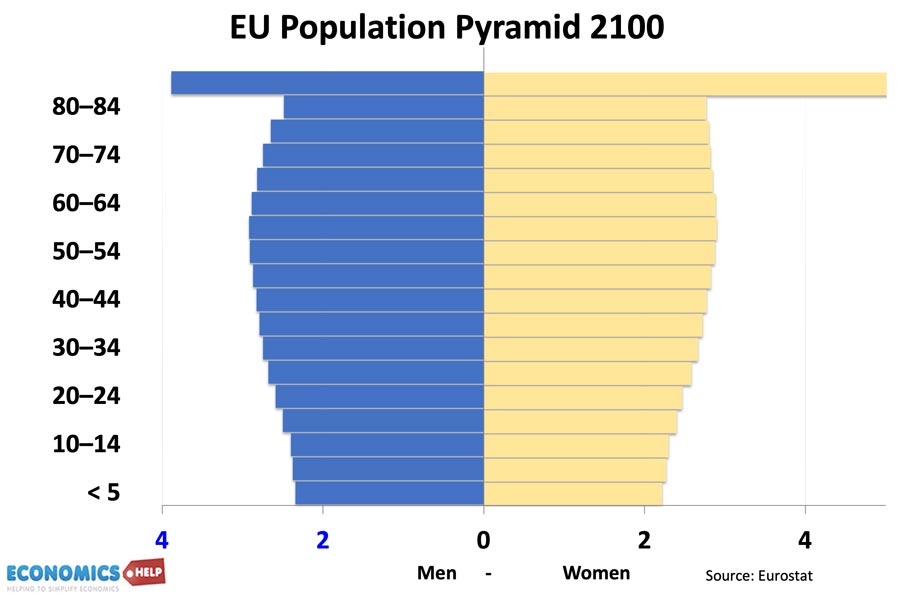
This is Europe’s population pyramid, by the end of the century, the biggest age group will be the over-85s.
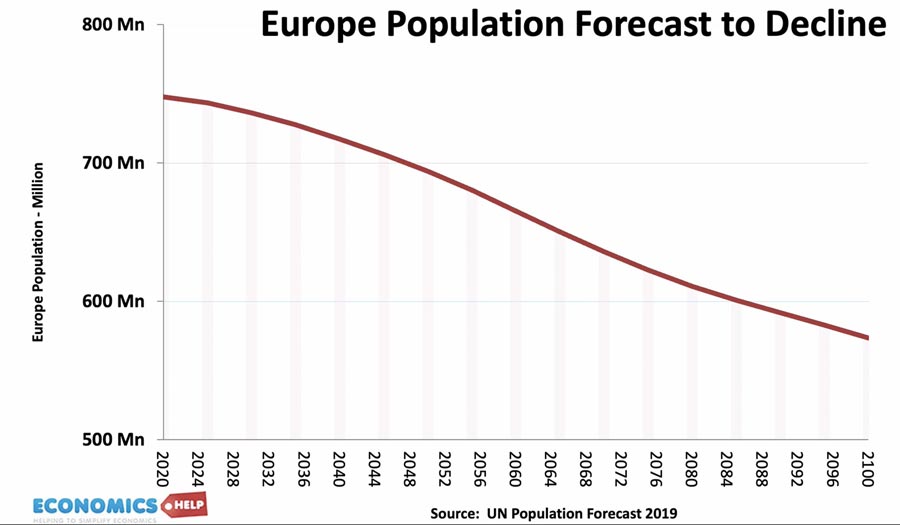
But, what are the costs? Like many countries, Italy’s debt to GDP has soared in recent years, how will it manage with a shrinking population, declining economy, falling tax revenues and an ageing population which need health care and pensions? Japan is an example of what might happen – the first country with a major population decline has experienced deflation, rising debt and low growth.
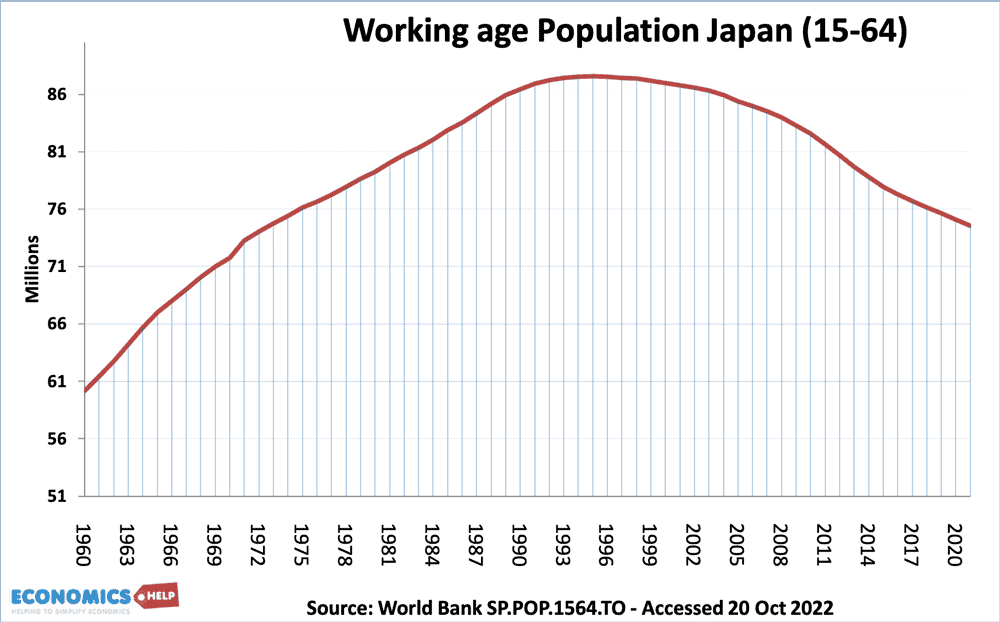
Italy’s birth rate of 1.2 is one of the lowest in the world, but it is not unique – other European countries are doing little better.
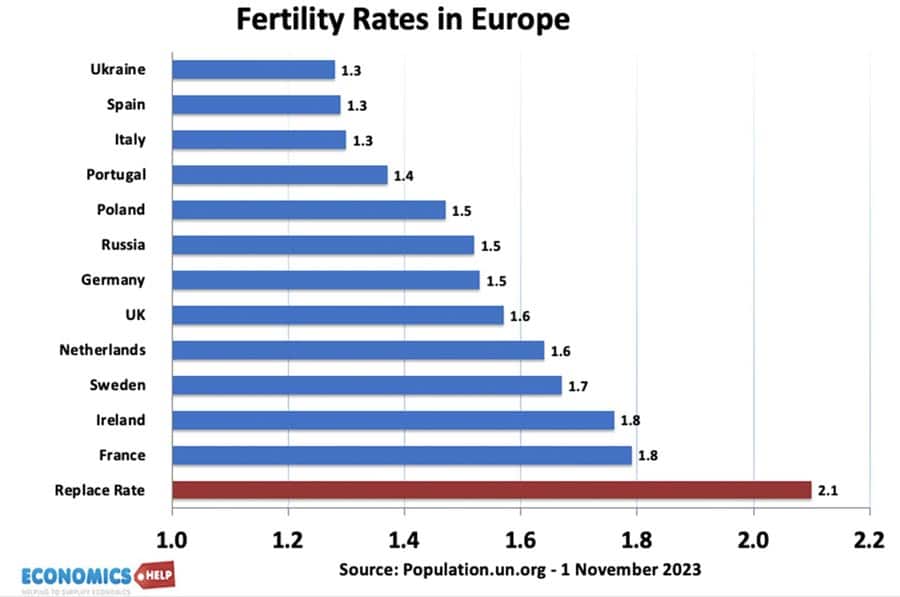
And the Covid years have only accelerated the trend to a lower population. Already, Italy has seen old villages hollowed out as people leave and this is a foretaste of what is to come. Worried by the decline in population, politicians have talked about the need to change the situation but so far they have proved powerless. Tinkering at the edges and encouraging people to have more children as a patriotic duty does little to change the powerful forces that have decreased birth rates.
Why are birth rates falling so fast?
The first reason for falling birth rates is a success story, improved education and greater equality for women have led to women delaying the period of getting married or having children. But, also a growing factor is the economic costs of having children. We are facing the first generation where children are likely to be worse off than their parents. In particular, hit by soaring housing costs, young people can’t afford the economic burden of more children. It is ironic that economic hardship is a leading cause of this impending population decline, which itself will impose economic costs on society.
Why does it matter if birth rates fall?
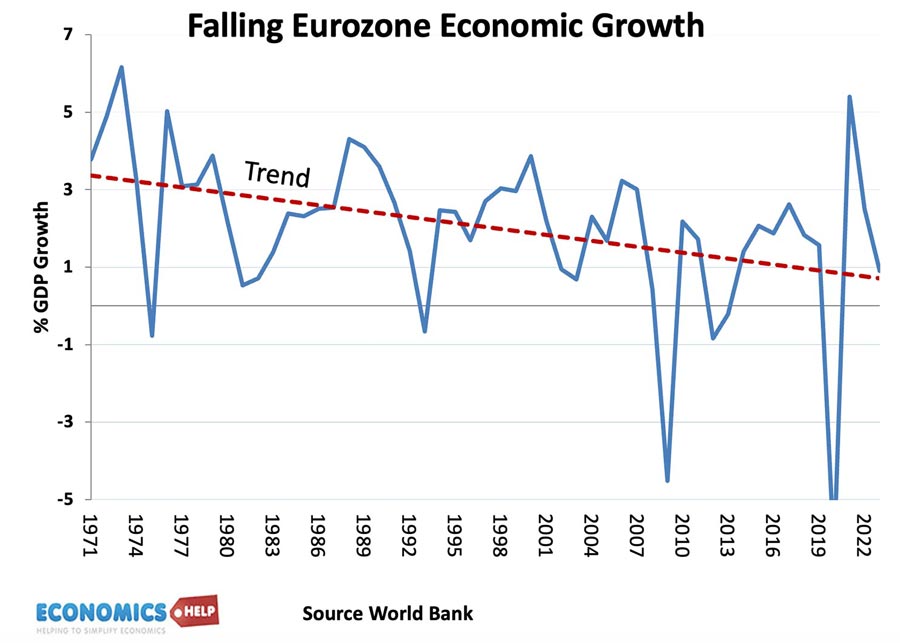
Since the global financial crisis, the world economy has slowed down. Europe has particularly struggled falling behind the likes of China, India and the US. If the population continues to fall, it will put more pressure on anaemic economic growth. The problem is that European countries have little room for manoeuvre. The national debt has soared due to the financial crisis, low growth, covid and the Ukraine War. An ageing population will cause a double whammy of falling tax revenues and higher spending on pensions and health care.
However, there is more bad news to come, Europe is attempting a transition to a green economy – an economy less reliant on Russian energy. This will require investment, but at the same time, long-term interest rates, which were low for so long, have increased. The UK’s interest payments have soared in the past year due to unexpected inflation and higher interest rates. This is a problem all European economies face, demographic factors pushing up government spending, with little room for borrowing. Tax rates as a share of GDP have been rising. But, the worst of the ageing population is still to come.
Cost of Health Care
The problem is we are living longer, but healthy life-expectancy is not necessarily keeping up. As people live longer, we face a range of health conditions which need expensive treatment. It is estimated by 2050, 2.2 million people in Italy will be living with dementia An academic report put the average annual cost of a dementia patient at around €70,000. And this is before the emotional and time cost on care-givers and relatives. It is not just that the younger generation will face higher taxes and lower growth, but there will be a need to spend more time in unpaid work, such as looking after ageing parents.
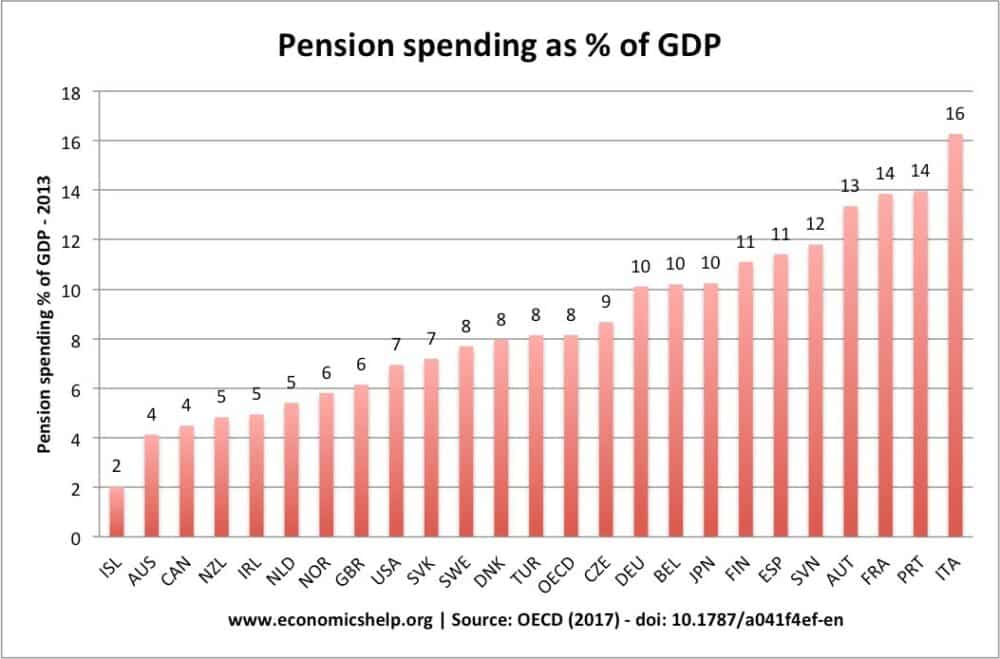
In Italy, Pension spending as a share of GDP is already 16%, but this is before the population ages further. The UK has a relatively low share of pension spending, but if the current trend is maintained the economist predict it could rise to 25% of GDP by 2025.
How is this going to be paid for? There is no easy answer. Politicians generally avoid taking difficult decisions. When France sought to rein in pension spending and raise the retirement age, it caused mass demonstrations. It’s not popular to tell people they are facing a worse trade off – the post-war boom years, where we could spend more on health care and pensions from economic growth is unlikely to be replicated.
It is not just economic impacts but also geo-political effects. In 2100, there will be more people living in one African country Nigeria, than the whole of the European continent. Given developing countries have scope to catch up with living standards of west, it will mark a profound change in geo-political influence.
Immigration is one obvious solution to the issue. Though, there is reluctance for political reasons to accept migration.
In the nineteenth century, Thomas Malthus warned that exponential population growth would cause mass starvation and collapse of economies. He was completely wrong, he completely failed to understand how new technologies and increased productivity would enable society to not only thrive but cope with ever rising populations. So is there a danger of making the same mistake? Could we actually cope and thrive with a fall in the population?
Firstly, technology is still growing at an exponential rate. Artificial intelligence is raising the possibility that many manual jobs can be done by technology, meaning fewer workers will be needed. If AI does the business, labour productivity will continue to grow. If governments can tax the profits of AI, then there is scope for paying for pensions.
Second, technology is likely to lead to breakthroughs in energy creation. Solar power has been improving at exponential rates. But, there is scope for new energy such as geothermal, nuclear fission. In Iceland, energy is virtually free, and it is likely this could spread to the rest of Europe in the next few decades. this could radically change society and improve living standards.
Europe is facing a housing crisis because the population has grown faster than its ability or willingness to build new houses. But, if the population did really fall, it would lead to cheaper and more plentiful housing. This might even help pick up birth rates.
Also, one of the great challenges the world will face is the economic and environmental impact of global warming and increased pollution. A falling population would lead to less power consumption and lower pollution and carbon emissions. Fewer people would be a boon to improving the environment and cause the demand for fossil fuels to decline. The age of relying on dictatorships for fossil fuel imports would be over.
In the 1930s, John Maynard Keynes predicted his children could do a 15 hour week. He believed new technology would enable people to work less. Alas, he wasn’t right, but AI could be the breakthrough which enables the automation of jobs, which would give people more time for looking after elderly relatives.
There are few concerns about this more optimistic scenario. Firstly, if AI does replace many jobs, who will benefit from this technological breakthrough? Will benefits be shared equally throughout society e.g. a universal basic income. Or will the profits be captured by a few big multinational corporations who use global tax avoidance to keep the profits in tax havens. If this happens, we could get the worst of both worlds, AI taking jobs, leaving many people unemployed but not getting the benefits. Secondly, is this brave new world of technology so desirable? Do we want to be cared for in our declining years by soulless robots? Our local supermarket has already gone to completely automated tills. My elderly neighbour, who lives alone, bitterly regrets the loss of an opportunity to interact with a human.
The impact of falling birth rates is going to be huge, but what will be the impact of today’s younger generation, so far, the young are struggling to gain the same security and wage growth as their parents, this video goes into more detail about why young generations are worse off.
